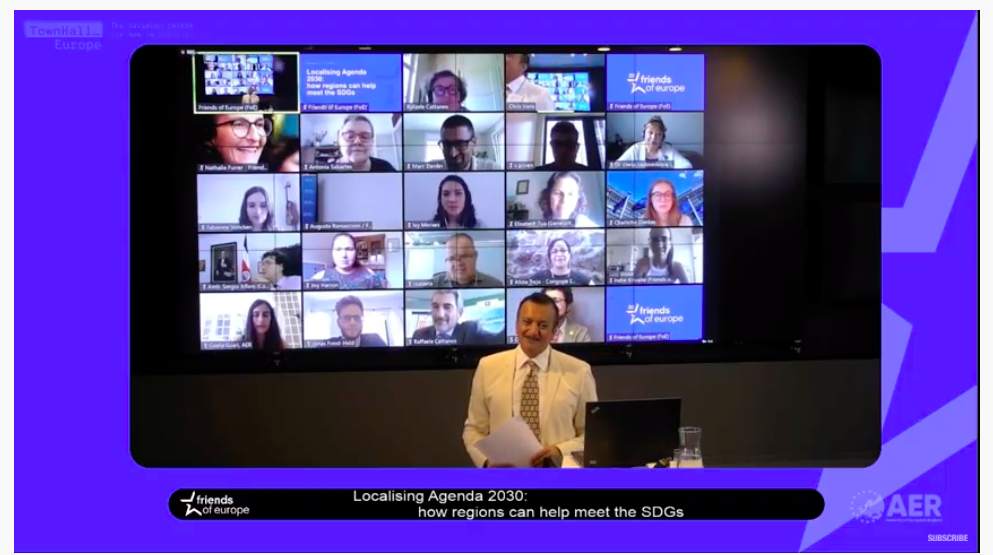
Last week, on 24 June, the online conference ‘Localising Agenda 2030: how regions can help meet the SDGs’ took place from 14:30 until 16:00 pm. This event, the first of a series of events focusing on SDGs leading up to our final conference taking place in Strasbourg in June 2021, aimed to emphasise the importance of local actions in achieving the Sustainable Development Goals. The event gathered 64 attendees via the Zoom platform and 50 others followed the live web-stream.
With the outbreak of COVID-19 pandemic, citizens have seen quick responses and actions from both regions and cities. The crisis has exposed inequalities and the role of regions for sustainable recovery and action for a more fair and resilient society can no longer be postponed. Together with national authorities, regions now have a moral responsibility to advance the achievements of the SDGs, namely by focusing on health and wellbeing and financial recovery through inclusive and sustainable economic growth.
Through this webinar, we had the opportunity to hear our speakers tell us more about the importance of regions. The webinar was moderated by Dharmendra Kanani, Director of Insights at Friends of Europe. The panel debate included five speakers.
The first speaker, who opened the discussion, was Magnus Bertnsson, President of the Assembly of European Regions (AER). He started the discussion by stating that yes, progress in achieving the SDGs had been made in Europe, but with COVID-19 appearing, there is a higher need for action and efforts to reduce inequalities must be accelerated. Local and regional authorities are among the main actors to achieve a more fair and resilient society which stresses the importance of a multilevel and a multilateral approach. Europe, post COVID-19, has the opportunity to create something new and to rethink what kind of society people want to live in.

The second speaker, Aziza Akhmouch, Head of the OECD Division for Cities, Urban Policies and Sustainable Development, shared a more analytical and factual approach to the importance of regional development policy. She stated that 65% of the SDGs could not be achieved without local and regional governments. While national governments are ultimately accountable in their performance to the UN, this does not mean that regions cannot be held liable. 80% of the regions from OECD countries, about 600 regions, are far from having reached the targets which shows why it is equally important to attribute an agenda to both national and local governments. The localisation of the SDGs is crucial.
The next speaker, Raffaele Cattaneo, Minister for Environment and Climate of Lombardy (IT); member of the Regions 4 Steering Committee, reflected on the need for a transformation in today’s economy. As a result of the public health crisis, economic recovery, alongside jobs and public health have become the top priority where a few months ago, climate used to be at the top of the agenda. Indeed, a lot of resources are now moving from green deal to health care systems. There is a need for a discussion between citizens and EU institutions to reset our priorities and transform our economy which will require clear political decisions as well as responsible production and consumption.
Wallis Goelen, Senior Expert at the European Commission Directorate-General for Regional and Urban Policy, emphasised the efforts of the EU Commission in order to respond to the needs of regions and cities as a result of COVID-19. She stated that the current cohesion policy measures respond to 11 SDGs out of the 17 existing while fostering regional development. However, she also stressed the importance of capacity-building and the use of place-based strategies which will now be at the forefront in the Commission’s new priorities.
The last speaker of this webinar, Damià Calvet, Minister of Territory and sustainability of the Government of Catalonia, representative of UCLG-Global Taskforce, explains the importance of regions in liaising national and European interests on SDGs and other topics. Regions have the capacity to empower a wider network of actors to bring change and achieve sustainable development together. According to him, sustainable development cannot be achieved without greater input from regions. Moreover, the contribution of the Global Taskforce Regions has a great importance in bringing regional and local authorities in order to unify forces and reach Agenda2030.
It is key to reiterate the need to give a more relevant role to regions. Whereas local governments are doing a great process in developing sustainable strategies and are very vocal about it, regions seem to be more silent. The COVID-19 crisis has opened the “pandora’s box” and has shown how many processes and involvement are needed from regional governments in order to achieve a sustainable and equally developed global society. AER as a regional network has assumed the role to raise awareness and to call into action its member regions to engage in achieving a global society that leaves no one and no territory behind.
****
